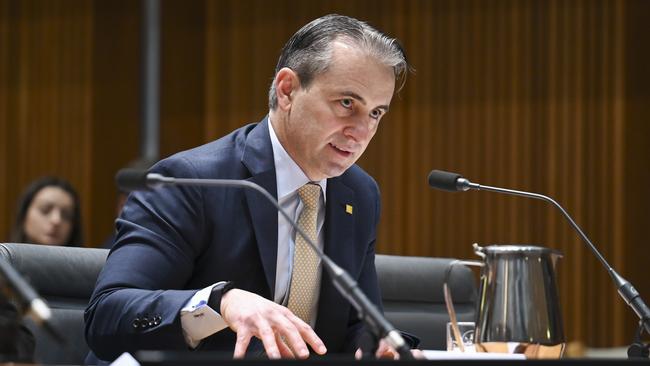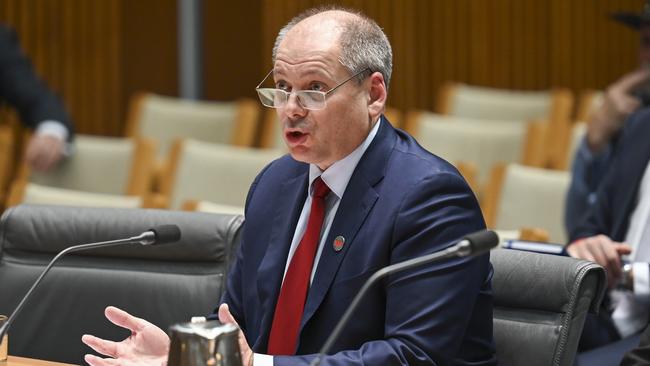Young families hit hardest by rates and inflation, say bank bosses Matt Comyn and Peter King
The cost of living and higher interest rates are hurting younger Australians more than most, the chief executives of Commonwealth Bank and Westpac have warned.

The cost of living and higher interest rates are hurting younger Australians more than most, the chief executives of Commonwealth Bank and Westpac have warned.
Appearing before the House Economics Committee in Canberra on Thursday, the executives warned that there was now a “two speed” customer base, with younger Australians – particularly working families with mortgages – bearing the burden of higher interest rates, while older Australians and those who owned their own homes were much better placed.
Commonwealth Bank CEO Matt Comyn said young families, particularly couples aged between 35 and 44, were being hit the hardest, with many having to run down their savings.
“Households and businesses have experienced extreme shocks in recent years – lockdowns, a demand surge, inflation and rapid interest rate rises,” he said.
“Many of our customers are finding it difficult to deal with the higher cost of living.”
He said households were responding by cutting back on discretionary spending and spending more on essentials.
“We can see that savings are being depleted, particularly by working families,” he said.
“Younger Australians, who tend to have lower incomes and smaller savings buffers, are the most sensitive to changes in prices.
“Those aged 35 to 44 have the highest share of mortgage balances and are most exposed to higher rates.”
Mr Comyn’s comments came one day after July consumer price inflation came in a higher than expected 3.5 per cent. The Reserve Bank has indicated it is unlikely to cut the cash rate from 4.35 per cent before February.
Mr Comyn said the impact of higher interest rates was being “unevenly felt across the country, with different experiences for borrowers and depositors.”
CBA had “deliberately and proactively contacted customers, and have initiated 132,000 tailored payment arrangements (this year) to those most in need”, he said.

Westpac CEO Peter King said the consumer was “doing the heavy lifting” in slowing the economy in response to rising interest rates. Total spending on credit and debit cards had “gone flat, with spending on a per capita basis falling”.
Mr King said there was a “two-speed customer base”, split between those with mortgages, who were doing it tougher, and others who had savings and were better off. He said mortgage loan stress had increased to around 1.4 per cent of Westpac’s book but was lower than expected, with more than 78 per cent of mortgage customers ahead on their mortgage repayments.
“Despite this, we recognise many Australian households are making difficult spending choices to balance their budgets.”
But he said the borrowers most in need of assistance were more likely to be first-home buyers who were owner-occupiers and people with high loan to valuation ratios.
The bank chiefs reported that the Australian economy had shown surprising resilience despite major challenges facing the global economy. Mr Comyn said the economy was “fundamentally sound, despite challenges and global uncertainty”.
Mr King also said the Australian economy was proving resilient compared to global peers, as it had been during the pandemic.
“Australia’s key economic indicators remain stable,” he said.
“… While we’ve seen low economic growth and slightly higher unemployment, this performance should be viewed in the context of global conditions, which are more challenging.”
Mr King said the Australian economy was “well placed for a return to higher levels of growth when pressures ease. Westpac economists expected official interest rates to start coming down from early next year and to eventually “settle in the low 3 per cent range”.
Mr Comyn said CBA, Australia’s largest home lender, was aware any movement in mortgage rates would be closely scrutinised when the Reserve Bank began cutting official rates.
“Then everybody waits to see what each of the big four banks does in the following 24 to 48 hours about how it is going to be passed through,” he said.

The bank chief executives were questioned by the committee on issues including bank branch closures in rural areas, credit card surcharges on digital transactions, their actions to combat scams and CBA’s move to increase the commissions paid to staff writing mortgages from 50 per cent of salary to 80 per cent.
Mr Comyn said he was committed to keeping all current regional bank branches open until the end of 2026 while Mr King said his bank had a moratorium on closing any more branches in regional areas until 2027.
The executives were grilled on credit card surcharges for tap and go transactions. NSW Labor MP Jerome Laxale held up a $5 note and asked why a cup of coffee would cost $5 if it was paid in cash but $5.08 with a credit card.
Mr Comyn said the “cost of acceptance” for electronic payments had fallen more than 30 per cent, with Australia having one of the lowest charges in the world.
The two chief executives hit back at criticism of the recent move by CBA to increase the potential commissions paid to its staff writing mortgages.
Committee chairman, Victorian Labor MP Daniel Mulino, said he was worried the move might signal a return to questionable practices that had been highlighted by the Hayne royal commission.

Mr Comyn said CBA had made the move to avoid losing business to mortgage brokers, whose commission levels were totally unregulated.
He said brokers now wrote far more mortgages than the banks and they were not subject to regulations on commissions or pay.
He said worries about the CBA paying higher commissions to the 1800 home lenders on its staff were “dwarfed” by the lack of regulation of the 20,000 mortgage brokers.
Mr King said Westpac had not yet followed CBA’s move but it was seriously looking at the issue given the competitive nature of the mortgage market, with new players like Macquarie becoming more active in mortgage lending.
Both banks detailed their increased focus on countering scams, including putting in place systems to alert customers.
Mr King said a big fall in the number of financial advisers – from 28,000 in 2018 to only 15,000 today – had left ordinary Australians more vulnerable to investment scams.
“One of the benefits of financial planning organisations is that they have an approved product list,” he said. “They do due diligence on what to invest in and what they allow financial planners to invest in. We have to find a way to get financial planning at scale (to ordinary Australians).”
NAB chief executive Andrew Irvine and ANZ chief executive Shayne Elliott will appear before the committee on Friday.






To join the conversation, please log in. Don't have an account? Register
Join the conversation, you are commenting as Logout